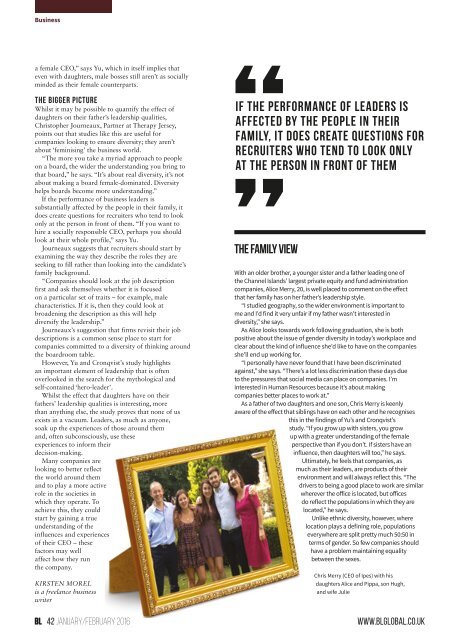BL Magazine
You also want an ePaper? Increase the reach of your titles
YUMPU automatically turns print PDFs into web optimized ePapers that Google loves.
Business<br />
a female CEO,” says Yu, which in itself implies that<br />
even with daughters, male bosses still aren’t as socially<br />
minded as their female counterparts.<br />
THE BIGGER PICTURE<br />
Whilst it may be possible to quantify the effect of<br />
daughters on their father’s leadership qualities,<br />
Christopher Journeaux, Partner at Therapy Jersey,<br />
points out that studies like this are useful for<br />
companies looking to ensure diversity; they aren’t<br />
about ‘feminising’ the business world.<br />
“The more you take a myriad approach to people<br />
on a board, the wider the understanding you bring to<br />
that board,” he says. “It’s about real diversity, it’s not<br />
about making a board female-dominated. Diversity<br />
helps boards become more understanding.”<br />
If the performance of business leaders is<br />
substantially affected by the people in their family, it<br />
does create questions for recruiters who tend to look<br />
only at the person in front of them. “If you want to<br />
hire a socially responsible CEO, perhaps you should<br />
look at their whole profile,” says Yu.<br />
Journeaux suggests that recruiters should start by<br />
examining the way they describe the roles they are<br />
seeking to fill rather than looking into the candidate’s<br />
family background.<br />
“Companies should look at the job description<br />
first and ask themselves whether it is focused<br />
on a particular set of traits – for example, male<br />
characteristics. If it is, then they could look at<br />
broadening the description as this will help<br />
diversify the leadership.”<br />
Journeaux’s suggestion that firms revisit their job<br />
descriptions is a common sense place to start for<br />
companies committed to a diversity of thinking around<br />
the boardroom table.<br />
However, Yu and Cronqvist’s study highlights<br />
an important element of leadership that is often<br />
overlooked in the search for the mythological and<br />
self-contained ‘hero-leader’.<br />
Whilst the effect that daughters have on their<br />
fathers’ leadership qualities is interesting, more<br />
than anything else, the study proves that none of us<br />
exists in a vacuum. Leaders, as much as anyone,<br />
soak up the experiences of those around them<br />
and, often subconsciously, use these<br />
experiences to inform their<br />
decision-making.<br />
Many companies are<br />
looking to better reflect<br />
the world around them<br />
and to play a more active<br />
role in the societies in<br />
which they operate. To<br />
achieve this, they could<br />
start by gaining a true<br />
understanding of the<br />
influences and experiences<br />
of their CEO – these<br />
factors may well<br />
affect how they run<br />
the company.<br />
KIRSTEN MOREL<br />
is a freelance business<br />
writer<br />
If the performance of leaders is<br />
affected by the people in their<br />
family, it does create questions for<br />
recruiters who tend to look only<br />
at the person in front of them<br />
THE FAMILY VIEW<br />
With an older brother, a younger sister and a father leading one of<br />
the Channel Islands’ largest private equity and fund administration<br />
companies, Alice Merry, 20, is well placed to comment on the effect<br />
that her family has on her father’s leadership style.<br />
“I studied geography, so the wider environment is important to<br />
me and I’d find it very unfair if my father wasn’t interested in<br />
diversity,” she says.<br />
As Alice looks towards work following graduation, she is both<br />
positive about the issue of gender diversity in today’s workplace and<br />
clear about the kind of influence she’d like to have on the companies<br />
she’ll end up working for.<br />
“I personally have never found that I have been discriminated<br />
against,” she says. “There’s a lot less discrimination these days due<br />
to the pressures that social media can place on companies. I’m<br />
interested in Human Resources because it’s about making<br />
companies better places to work at.”<br />
As a father of two daughters and one son, Chris Merry is keenly<br />
aware of the effect that siblings have on each other and he recognises<br />
this in the findings of Yu’s and Cronqvist’s<br />
study. “If you grow up with sisters, you grow<br />
up with a greater understanding of the female<br />
perspective than if you don’t. If sisters have an<br />
influence, then daughters will too,” he says.<br />
Ultimately, he feels that companies, as<br />
much as their leaders, are products of their<br />
environment and will always reflect this. “The<br />
drivers to being a good place to work are similar<br />
wherever the office is located, but offices<br />
do reflect the populations in which they are<br />
located,” he says.<br />
Unlike ethnic diversity, however, where<br />
location plays a defining role, populations<br />
everywhere are split pretty much 50:50 in<br />
terms of gender. So few companies should<br />
have a problem maintaining equality<br />
between the sexes.<br />
Chris Merry (CEO of Ipes) with his<br />
daughters Alice and Pippa, son Hugh,<br />
and wife Julie<br />
42 January/february 2016 www.blglobal.co.uk

















